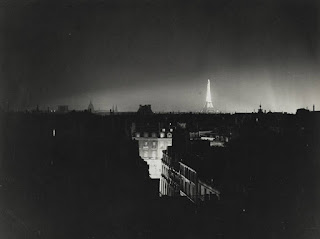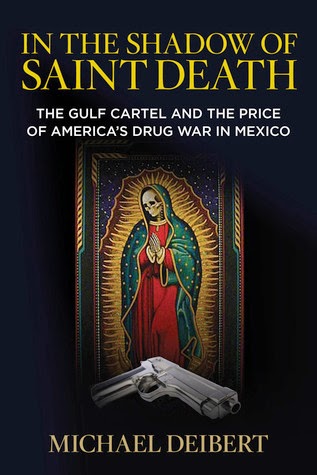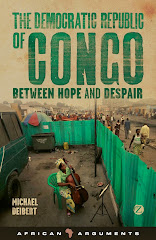"Freedom is my sect," protest in Al-Zabadani, Rif Dimashq Governorate, Syria
Desert Solitaire by Edward Abbey
Published in 1968, this book serves as something of an elegy to an American West that was vanishing even then, suffused with lyrical, though never mawkish, descriptions of desert springs (some of them poisoned), thunderstorms and a beautiful account of a multiday odyssey paddling down the Colorado River.
“The desert says nothing,” Abbey writes. “Completely passive, acted upon but never acting, the desert lies there like the bare skeleton of being, spare, sparse, austere, utterly worthless, inviting not love but contemplation…Despite its clarity & simplicity, however, the desert wears at the same time, paradoxically, a view of mystery. Motionless and silent it evokes in us an elusive hint of something unknown, unknowable, about to be revealed. Since the desert does not act, it seems to be waiting - but waiting for what?”
Congo's Violent Peace: Conflict and Struggle Since the Great African War by Kris Berwouts
A very useful primer by the Belgian author and analyst that is especially illuminating in the light it sheds on the inner working of the government of Democratic Republic of Congo President Joseph Kabila, in office since 2001 and now attempting to cling to power.
Hitler's Hangman: The Life of Heydrich by Robert Gerwarth
One of the darkest figures in the Nazi pantheon, police chief and and “Deputy Protector of Bohemia and Moravia” Reinhard Heydrich is the subject of this chilling, highly readable biography by German historian Robert Gerwarth. Tracing Heydrich’s role in the Nazi evolution to genocide, Gerwarth does an excellent job of demonstrating how the gradual whittling away of the ability to see any humanity in Nazi opponents - Jews, communists, gypsies and others - eventually laid the groundwork for mass slaughter, as telegraphed by the invasion of Poland in September 1939 when “the targeted liquidation of Poles noted for their education, nationalism or social status demonstrated that the Nazis were capable of and committed to murdering by the thousands.” The “effective system of terror” it had taken Heydrich and his nominal boss Heinrich Himmler less than a year to set up in Bavaria was soon ubiquitous, with traditional security forces now managed by rabid ideologues and, as this book demonstrates, step by step, the minute bureaucracy of mass murder becomes a tool of the German state.
Revulsion: Thomas Bernhard in San Salvador by Horacio Castellanos Moya
A 100 page satirical tirade against the author’s native country of El Salvador - in which the narrator expressed a consuming terror of one day being trapped and which, in his view, “is a hallucination, it exists only because of its crimes” - this often uproariously funny novella provides a dim survey of the nation in the years following the end of its civil war.
“These politicians reeking of the blood of the hundred thousand people they sent to their deaths thanks to their big ideas,” Castellanos Moya writes. “It doesn’t matter if they’re right-wing or left-wing, they’re equally vomitous, equally corrupt, equally thieving, you can see in their faces how anxious they are to rob what they can...These crooks in suits and ties that once had their feast of blood, their orgy of crimes, they dedicate themselves now to a feast, an orgy, of plundering.”
Hadriana in All My Dreams by René Depestre
A magical realist tale of eroticism and vodou that brilliantly evokes the southern Haitian town of Jacmel (where I lived for a time), this novel by one of Haiti’s greatest living author appeared in English for the first time last year. Though the text becomes somewhat bumpy with awkward literal translations of place names (the Haitian town of Croix-des-Missions becomes “Mission’s Crossing,” for example, a name meaningless to anyone in Haiti), Depestre’s words still come through as often intensely poignant, such as when he writes “for the first time since leaving Jacmel, I was able to think without sadness about all those years of failure and guilt that stretched behind me in the swirling elsewhere of Haiti."
Ghost Stories by M. R. James
Spooky and intensely British, this collection contains such classics of the genre as “After Dark in the Playing Fileds,” “A View from a Hill” and “Casting the Runes” and makes an entertaining distraction from weightier matters.
Moonbath by Yanick Lahens
A beautifully conceived and realized novel from Haiti appearing in English for the first time, this book tells the story of “a village lost between stone, sun, sea and rain” in “a country where the most dependable weapon is erasure; the most lucrative defense, evasion. To let the storm pass, before spreading our wings again and running with the pack of the moment.”
Moonbath shows how the destitute and struggling so frequently find themselves, through little fault of their own, either the subjects of the cloying largess or violent bullying of the country’s various political factions, with repeated references to the depredations of both former presidents François Duvalier and Jean-Bertrand Aristide.
Simone by Eduardo Lalo
Part romance, part detective story, this novel traces the fraught relationship between a Puerto Rican writer and an immigrant Chinese student in San Juan .
Syrian Notebooks: Inside the Homs Uprising by Jonathan Littell
I would not have predicted that the author of the World War II historical novel
Les Bienveillantes (The Kindly Ones) would author one of the best pieces of modern war reportage I’ve read in many years, but this account of the resistance to Syria’s dictator Bashar al-Assad and his crime family in the western Syrian city of Homs is certainly that. Introducing the reader to an extraordinarily wide swathe of liberation fighters, civil society activists, doctors and others, Littell gives some flavor of the scope and complexity of the forces that rose up to try and topple Syria’s dictatorship. As regime snipers deliberately target children and non-Arabic speaking “specialists of the Arab-Muslim world” serve up war crimes denial, the tragedy that later befell the rebel movement, becomes palpable.
“Smiling and full of life and courage,” Littell writes of these early heroes. “For whom death, or an atrocious wound, or ruin, failure, and torture were nothing compared to the incredible joy of having cast off the dead wight crushing, for forty years, the shoulders of their fathers.”
Guadalajara by Quim Monzó
Brief, surrealistic vignettes by the respected Catalan writer
Mundo Cruel by Luis Negrón
By a noted Puerto Rican author, one of the best short story collections I've read in years. Poignant, wistful, emotionally powerful. Recommended.
The Anatomy of Fascism by Robert O. Paxton
An important survey of how fascism took hold in the first half of the 20th century in Italy, Germany, Hungary and Romania, this book examines how a mad supremacist philosophy was able to sweep to power with establishment “accomplices who helped at critical points,’ whether they be Italy’s King Victor Emmanuel III, who refused to sign Prime Minister Luigi Facta’s martial law decree blocking Mussolini’s blackshirts from entering Rome, or the veteran diplomat Konstantin von Neurath, who served as foreign minister during the early years of Nazi rule. Paul Ryan and Mitch McConnell might find much to recognize here.
“The fascist route to power has always passed through cooperation with conservative elites,” Paxton writes, going on to conclude “no dictator rules by himself. He must obtain the cooperation or at least the acquiescence of the decisive agencies of rule - the military, the police, the judiciary, senior civil servants - and of powerful social and economic forces.”
Though published more than a decade ago, the book reminds more timely than ever, as does Paxton’s conclusion about the nature of fascist political rule:
Fascism may be defined as a form of political behavior marked by obsessive preoccupation with community decline, humiliation, or victimhood and by compensatory cults of unity, energy, and purity, in which a mass-based party of committed nationalist militants, working in uneasy but effective collaboration with traditional elites, abandons democratic liberties and pursues with redemptive violence and without ethical or legal restraints goals of internal cleansing and external expansion.
Georges Bataille: An Intellectual Biography by Michel Surya
An interesting survey of a deeply strange man, this biography of the transgressive French writer and philosopher contains many surprising details, such as those of Bataille’s early fervent Christianity and of the internecine politics and squabbles of the French surrealist movement of the 1920s.
“My true church is a whorehouse, the only one that gave me true satisfaction,” Bataille once wrote. “Ending up drunk and red-faced, in a dive full of naked women.” This book gives some idea of the kind of figure who managed to hold down a job with the
Bibliothèque Nationale while still penning such works such as
L'histoire de l'œil (Story of the Eye).
The Collaborator Book by Mirza Waheed
A searing portrait of occupation, repression, state terror and familial and community ties amid India’s war in Kashmir.
Burning Country: Syrians in Revolution and War by Robin Yassin-Kassab and Leila Al-Shami
An indispensable history of the uprising against Syrian tyrant Bashar al-Assad, this book lays out clearly why the ossifying, four decade-old family dictatorship was ripe for collapse.
Cosmetic attempts at reform in the early 2000s were then ruthlessly reversed when it appeared they might flower into an actual independent civil society, a reaction that included the ruthless repression of Syria’s Kurds and the apparatus of a terrifying police state where torture was systematic and systemic.
Despite the “anti-imperialist” rhetoric Assad’s regime employed, it was only too happy to put its skills in oppression to use on behalf of the “war on terror,” hosting and torturing terrorism suspects on behalf of the United States following 2001 (despite at the same time allowing Salafist remnants to operate unimpeded in Syria to launch attacks against the U.S. in Iraq).
Though little remarked upon at the time, the spark for Syria’s revolt was not some dark foreign plot, but was rather literally set when Hassan Ali Akleh set himself on fire in in the small town of al-Hasakah in January 2011, only weeks after Mohamed Bouazizi had done the same in Tunisia. The Assad family responded to the Syrian peoples’ calls for democracy with sickening crimes, including the kidnapping and killing of schoolboys who wrote revolutionary graffiti in Daraa in March 2011 and the torture and murder of 13 year-old Hamza Ali Al-Khateeb in the same city two months later.
The book reminds readers that, from March to October 2011, while it was massacring non-violent protesters, the Assad regime was busy releasing violent jihadists from its own prisons, including Jaysh al-Islam’s Zahran Alloush, Ahrar al-Sham’s Hassan Abboud, Awad al-Makhlaf (late a key figure in ISIS) and founding members of Jabhat al-Nusra. Eager to brand the Syrian revolution as a sectarian conflict, the regime itself targeted Sunni areas for collective punishment, including during massacres of Sunnis on Syria’s central plain between Homs and Hama during the summer of 2012. As the authors note, by the summer of 2013, Assad’s battles were increasingly directed by Iranian military experts, and Iranian-funded and trained Shia militias helped the regime ethnically cleanse areas such as Zabadani and Daraya. Lebanon’s Hezbollah and the Iraqi organizations Kata’b Hizbollah and Asa’b Ahl al Haqq also helped.
Assad was often helped in buttressing this narrative by the lack of nuance of foreign writing on the revolt. Early banners with slogans such as “Freedom is my sect” and the early demonstrations in Aleppo which brought together Arabs and Kurds, Christians & Muslims, holding both cross & crescent aloft, and the winter 2013/2014 offensive in the same city which pushed ISIS out, were lightly covered by the Western media. United Nations envoy Staffan de Mistura also proved reliably sympathetic to the regime’s point of view.
In the most shameful chapter of his presidency, readers witness U.S. President Barack Obama’s erasing of his own “red line” following the Assad regime’s use of chemical weapons, after which, the activist Lubna al-Kanawati says, “a profound sense of depression and isolation afflicted the people. They knew they’d die hungry and in silence, ignored by the world.” Likewise, we witness Obama’s refusal to help local forces in Deir ez-Zor which fell in July 2014, leaving its oil fields to ISIS, and the cynical on/off spigot of arms to bring Assad to negotiating table but not topple him.
The book does a great service to the historical memory of the Middle East, preserving for history within its pages such important (and now dead or missing) figures as human rights lawyer and civil society activist Razan Zaitouneh, Ghaith Matar (who came up with the idea of giving a rose and bottle of water to soldiers during protests) the filmmaker Bassel Shehadeh and the economist and anarchist Omar Aziz.
We are left with a chronicle of the failure of humanity to stop, as they did Franco’s march across Spain more than 70 years earlier, a great atrocity that the whole world watched unfold, and a betrayal of the dreams all freedom-loving people hold dear. With many of my fellow Western leftists engaging in genocide and war crimes detail on behalf of the Assad regime, we are left to ponder the words of the great Syrian writer and dissident Yassin al-Haj Saleh, quoted within its pages
I am afraid that it is too late for the leftist of the West to express any solidarity with the Syrians in their extremely hard struggle. what I always found astonishing in this regard is that mainstream western leftists know almost nothing about Syria, its society, its regime, its people, its political economy, it contemporary history. Rarely have I found a useful piece of information or a genuinely creative idea in their analysis. My impression about this curious situation is that they simply do not see us; it is not about us at all. Syria is only an additional; occasion for their old anti-imperialist tirades, never the living subject of the debate…We rank-and-file Syrians, refugees, women, students, intellectuals, human rights activists, political prisoners…do not exist…But honesty I’ve failed to discern who is right and who is left in the West from a leftist Syrian point of view…Before helping Syrians or showing solidarity with Syrians, the mainstream western left needs to help themselves.






